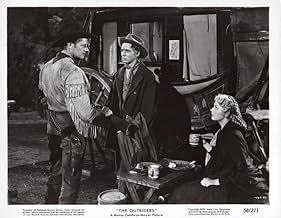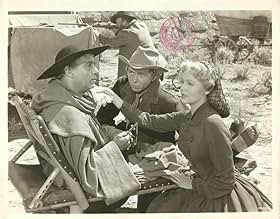Füge eine Handlung in deiner Sprache hinzuIn 1865, three escaped Confederate POWs are coerced into joining an offshoot of Quantrill's raiders who are planning to rob a Union gold shipment concealed in a civilian wagon train going fr... Alles lesenIn 1865, three escaped Confederate POWs are coerced into joining an offshoot of Quantrill's raiders who are planning to rob a Union gold shipment concealed in a civilian wagon train going from Santa Fe to St. Louis.In 1865, three escaped Confederate POWs are coerced into joining an offshoot of Quantrill's raiders who are planning to rob a Union gold shipment concealed in a civilian wagon train going from Santa Fe to St. Louis.
- Farmer's Wife
- (Nicht genannt)
- Outrider
- (Nicht genannt)
- Farmer's Son
- (Nicht genannt)
- Prisoner
- (Nicht genannt)
- Boy Telling About the War
- (Nicht genannt)
- Wagon Driver
- (Nicht genannt)
- Prisoner
- (Nicht genannt)
- Ross
- (Nicht genannt)
- Outrider
- (Nicht genannt)
Empfohlene Bewertungen
The same can be said of other MGM films from the late 1940's and early 1950's that I've seen. RKO, 20th Century-Fox, or Paramount would have made this film in a more exciting and engaging manner. For some reason, MGM films from around this time tended to pull their punches.
The other virtue of the studio system is the stable of professional actors who perform their roles not to steal scenes but in service of the plot. Joel McCrea may excel even Randolph Scott in saying the most with the least words while never ever lying--the Western-hero actors of their generation internalized completely the cowboy as a latter-day knight, and the alchemy of script and star is fascinating. Arlene Dahl may be even more economical with her speech than McCrea. In the central dance scene she speaks not a word until a critical moment, then agrees to dance with McCrea only if he bows to put fresh shoes on her feet. The scene is all about sex, but the actors, the script, the direction, and the genre completely control the sexuality's expression.
In the supporting ranks James Whitmore, not yet 30, is convincing as an old-coot warrior-sidekick with kidney trouble, while Ramon Navarro--a former sex symbol entering his 50s--plays a Mexican padrone who's still got chops. Barry Sullivan and Jeff Corey remain menacing even when they're acting cooperative. Claude Jarman, Jr. is always worth watching but the director or editor seemed to forget he was in the movie.
I couldn't stop watching, but the less-enthusiastic reviewers have a point. The film fulfills its genre so professionally that it never falls below a certain level. But those same qualities make its most beautiful moments somewhat understated, like something even better might once have been imagined but for now they need to finish a movie.
Plot sees McCrea as Will Owen, the alpha male of three Confederate prisoners who escape from Camp Benton Stockade and promptly get recruited by one of William Quantrill's Bushwhacker units. Assigned to infiltrate a Don Chaves (Novarro) run wagon train that's carrying a fortune in gold, the men must deal with Indians, each other, and the hazards that the journey throws up.
Out of MGM with some production value of note, The Outsiders rises above simplicity of story to unfurl a darn fine Oater. Narratively it has strengths, where Owen's moral conscience forms a spiky backdrop to plotting. Be it his views on the unsavoury tactics employed by Keeley's (Corey) Bushwhackers, and his place as the undercover leader leading the wagon train to doom, or the positioning of his feelings - and others around him - towards the female of the group (Dahl) and that of her teenage brother-in-law. Owen is definitely in emotional turmoil.
From an action stand point the pic doesn't short change, with Indian attacks, internal fisticuffs and a rousing chase followed by the big siege finale, all of which are delivered admirably and scored robustly by Previn. The stand-out, though, is a high energy section of film that sees the group trying to get over a river at high tide flood level and is running a current of death! These scenes are expertly constructed and are of the breath holding standard. Yet the greatest part of the piece finds the group indulging in a square dance evening, where the men are blowing away the cob-webs with hooch, while the delectable Dahl holds court right in the middle. The sexual tension is palpable, the atmosphere electric, and as it happens, it forms a key part of proceedings.
Tech credits are high as well, led by the the excellent capturing of the Utah locations by Schoenbaum, this is most pleasing on the eyes. Technicolor is perfect for such an airy Oater, the primary colours positively booming on the screen (check out the water and fire shots), while Dahl was made for such colour lenses. The aforementioned square dance sequences showcase her sexual beauty, with flaming red hair and glorious emerald green shoes acting as glorious crowns to a most appetising filling.
Yes the story is soft, and anyone jaded by the formula of many 1950s Westerns should probably avoid this one - with most almost certainly knowing how it's going to pan out anyway. But there's so much to like here for me to suggest it's an undervalued pic and worth seeking out. Especially for McCrea and Dahl fans. 7/10
Here to the premise is three men who also go their separate ways as a result of the Civil War. Here the shared experience is prison camp. Joel McCrea, Barry Sullivan, and James Whitmore are Confederate prisoners who escape in early 1865. In effecting their escape they fall into the hands of a rebel guerrilla leader played by Jeff Corey.
Being guerrillas these guys don't play by the rules. The trio either goes west to Santa Fe to act as Judas goats and lead a gold train into ambush or die right there. Even the always honorable Joel McCrea sees he has no options here.
The rest of the story is how the conflicts internal and external are resolved and how the three escaped prisoners decide what course they have to take. Oh, and Joel McCrea meets up with Arlene Dahl and she kind of helps him along in the decision process.
The movies never had a more honorable or stalwart hero than Joel McCrea. And if you've seen any of his films, fans will know that whatever he does it will be the honorable thing. It's a tribute to McCrea that if he insisted on always being the stalwart hero, he had the talent and personality to carry it off.
It's familiar ground for Joel McCrea, but western fans will like the story and the gorgeous technicolor photography that captures it.
Wusstest du schon
- PatzerWhen Will puts Jen's shoes on her, she is wearing sheer stockings. In the 19th Century, since hemlines were ground level, and ankles could not be seen, sheer stockings would have been pointless. Silk and rayon stockings only came about in the 1920's (and nylon in the 1940's) when hemlines rose and showed off a woman's ankles and calves. In the 1860, women's stockings would have been either wool or cotton, and what Jen is wearing when Will puts her shoes on her feet are sheer and NOT wool or cotton.
- Zitate
Clint Priest: Me, I kinda relish gettin' old... takes the bother out of livin'.
- VerbindungenReferenced in Brustbild bitte! (1950)
Top-Auswahl
- How long is The Outriders?Powered by Alexa
Details
Box Office
- Budget
- 1.621.000 $ (geschätzt)
- Laufzeit
- 1 Std. 33 Min.(93 min)
- Seitenverhältnis
- 1.37 : 1

























